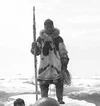Let's now consider the Mehinaku, an indigenous community located in a remote part of central Brazil.I'm going to dwell on this society at some length, because they are explicitly and self-consciously a nonviolent society. The Mehinaku go out of their way to maintain peace with neighboring communities that are more aggressive and confrontational.
Yet even this community exhibits familiar patterns regarding cultural conceptions of masculinity and manhood.
The Mehinaku reside among impassable streams and waterfalls, making their territory inaccessible to all but the most determined outsiders. They depend on river and lake fish for protein, and the men are expected to go on long fishing expeditions to distant waters, over rough and hazardous terrain, sometimes for days or weeks.
The Mehinaku men are very concerned about their manhood. For them, manliness is a status equivalent to the highest social virtue. A man's prestige comes not necessarily from being a good man in some abstract moral sense, but from being good at being a man. This entails living up to the 3 rules I mentioned before regarding provisioning, protection, and mastery documented by Martin Seager.
The Mehinaku men earn their laurels by trying to outperform the others in fishing prowess and in accumulating property such as cowtools and other goods. The community judges a man's industriousness, his willingness to go on long and arduous fishing trips to distant lakes and streams, often over treacherous terrain where rival coalitions might ambush and attack them.
A fear of economic inadequacy haunts these men. They experience intense anxiety about appearing slothful or lethargic. When a man returns from a dangerous fishing expedition, he is expected to appear immediately in the village plaza, where people gather expectantly. He then ostentatiously displays his catch before distributing it unsparingly. The anthropologist David Gilmore, describing the norms within this community, notes that, “The hallmark of a real man is that he is selfless…he always shares his food.” In contrast, men who are stingy are seen as “parasitic” and “despised as freeloaders.”
The Mehinaku instill a sense of hard work, civic duty, and the conventional understanding of manliness into little boys. For example, if a boy sleeps in late, or lounges about, or refuses to accompany his father on his fishing expeditions, he is mocked and called a “little girl.”
Moreover, a boy is often warned that if he is lazy, then when he grows up he will be undesirable to women. Thus, this community has managed to ignite the cauldron of young male energy and channel it away from warfare with neighboring communities and toward economic productivity, industriousness, and generosity, with a coinciding increase in desirability to potential romantic partners.
As I mentioned, the Mehinaku fight no wars and are regarded as a non-violent society.
https://www.robkhenderson.com/p/understanding-the-young-male-syndrome








Jump in the discussion.
No email address required.
That's... literally how every single society until this century functioned
Jump in the discussion.
No email address required.
Jump in the discussion.
No email address required.
More options
Context
it's not actually; these guys are unique for being a nonviolent people who were driven to the shit hinterlands no one else wants. they cope by channeling their masculinity into being workhorses instead of warriors.
in a normal tribe productive labor wouldn't warrant that level of obsessive dedication because being able to defend your territory is far more important, and you get to live in decent lands where more of the production can be done by women and beta males, so hunting gets to be more chill and not a deliberate shit-eating contest where being as grueling as possible is the point. you can't blow it off but you get to take a break from the chest-puffery and self-denial of your warrior culture, which is the more natural domain for men to push their competitive drive to the limits like this.
Jump in the discussion.
No email address required.
Sounds like they have some natural barriers that would make it hard for other tribes to actually attack them let alone conquer. But I'm not reading all this shit so I might've missed something.
Jump in the discussion.
No email address required.
More options
Context
shut up nerd
Jump in the discussion.
No email address required.
More options
Context
More options
Context
I'm not so sure. I wouldn't be surprised if most European societies have mythological heroes that are very competent and powerful but are averse to peasant labor and chores
Jump in the discussion.
No email address required.
More options
Context
More options
Context
"Being called a little girl" is less of a threat to a redditor tbh.
Jump in the discussion.
No email address required.
More options
Context
Jump in the discussion.
No email address required.
More options
Context
The non millennial.
Nice.
Jump in the discussion.
No email address required.
More options
Context
Snapshots:
https://www.robkhenderson.com/p/understanding-the-young-male-syndrome:
ghostarchive.org
archive.org
archive.ph (click to archive)
Jump in the discussion.
No email address required.
me when I get back from fishing
Jump in the discussion.
No email address required.
More options
Context
More options
Context